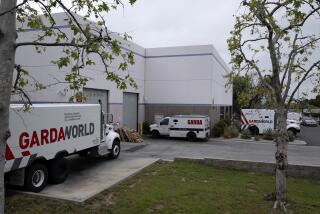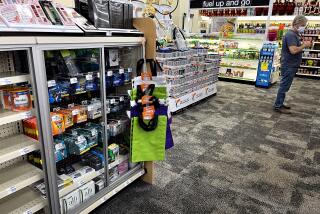Shoplifting of Rental Videotapes Darkens Profit Picture : Wherehouse Moves to Halt Thefts
- Share via
Wherehouse Entertainment has hustled to stay ahead of the pack in the young but burgeoning business of renting videocassettes.
It was the first chain retailer in the field. It was the first to put recorded videotapes on the sales floor rather than behind a counter. And it was the first to develop a computerized checkout system to speed customers’ transactions.
Now it appears to be the first to encounter, on a significant scale, an inevitable problem: the shoplifting of rental cassettes.
Although Wherehouse will not say how large the inventory loss has been in dollars or units, it took the unusual step last month of acknowledging publicly that thefts were a serious problem that had reduced profits by an undisclosed amount in the fourth fiscal quarter ended June 30 and will probably result in lower earnings for the first quarter ended Sept. 30. In the first fiscal quarter last year, the company had net income of $1.05 million, or 17 cents a share.
The company has given few details of the shoplifting problem. But in an announcement Sept. 24, President and Chief Executive Louis A. Kwiker said that “the company will take substantially larger reserves for possible inventory shrinkage. . . . The shrinkage, which occurred in the second half of fiscal 1985, was out of line with prior experience.”
The investment community reacted with a vengeance. Wherehouse stock, which was trading at about $23.25 a share on the American Stock Exchange before the announcements, has since dropped to $13.50 (adjusted to reflect a recent stock split and a recent stock dividend). On an adjusted basis, the stock’s price before the announcements would have been about $18.625.
Wherehouse is moving swiftly to combat the problem by spending $1.4 million to install electronic article-surveillance systems in the 86 of its 144 stores that display rental videotapes on the sales floor, Kwiker said in an interview at his Gardena headquarters last week. In addition, Kwiker has enlisted two-person undercover teams who rove the company’s stores in search of would-be shoplifters. Kwiker added that he does not believe that the thefts were the work of an organized professional ring but rather appear to be the work of individual shoplifters.
The stakes are certainly high. Whereas records are sold to Wherehouse on the wholesale level at $3 to $6, a recorded videotape may cost the company anywhere from $15 to $60.
Analysts place Wherehouse’s inventory loss at between $1 million and $2 million and expect the company to announce an increase of about $1.5 million in its after-tax, first-quarter reserve shortly before it reports quarterly earnings on Nov. 15. Although they are divided on whether the company recognized the problem fast enough, they generally agree that Wherehouse’s decision to install an electronic surveillance system should eliminate the problem within a few months.
Dick Edelman, an analyst with Schneider, Bernet & Hickman in Dallas, said that he was surprised by the inventory-shrinkage announcement but that “it’s not the worst thing that could happen. With retail operations that are growing quickly and trying to keep up with demand, sometimes it tends to get a little bit hectic.”
The lucrative new industry of renting and selling recorded videocassettes of movies and other programs is an outgrowth of the explosive growth in sales of videocassette recorders over the last few years. Recognizing the potential of a market that analysts estimate could be worth $5 billion by 1988, thousands of mom-and-pop tape-rental businesses have sprung up on neighborhood corners and in mini-malls, waging war with established chains such as Wherehouse, Tower, Music Plus, Licorice Pizza and Federated.
In most rental stores, a customer chooses an empty cassette box displayed on the sales floor and waits for a cashier to locate the live tape behind the counter. The customer leaves a personal check or signed credit card slip to cover the cost of the tape in case it is not returned within a prescribed time.
At prime rental times, all this often adds up to long waits for customers.
“From a customer standpoint, it was absolutely necessary” to change the system, Kwiker said. “Our lines were unacceptable.”
Speeded Up Process
To stand out in its crowded field, fast-growing Wherehouse, which started renting tapes in 1981, set out last year to devise a way to make the process easier and faster for customers. Wherehouse spent $4 million in fiscal 1985 to install a computerized checkout system called Merlin that was designed to cut labor costs and speed transaction times. The company plans to spend an additional $2 million to put in the system at 48 new stores this fiscal year, Kwiker said. (Video rentals accounted for about one-quarter of Wherehouse’s $137.8 million in revenue in fiscal 1985, when the company earned $6.4 million, or $1.22 a share.)
Starting late last year, rental tapes--Wherehouse stores stock between 2,000 and 4,500 titles, charging $1 or $2.50 per night for their use--were moved to racks on the sales floor.
Each tape is equipped with a unique bar-code strip, as is each customer’s credit card. Now, when a customer wants to check out a movie, he or she takes it to the cash register, where a cashier uses a wand to scan the bar code and the credit card. When the tape is returned, it is scanned again and the system automatically determines the amount owed. Kwiker contends that each transaction can be completed in six seconds.
Aware that putting tapes on the sales floor might encourage pilferage, Wherehouse immediately began testing security systems. Until last spring, it was stymied because available systems were suited to sale but not rental items. A customer returning a videotape would trigger the alarm, just as would someone trying to remove a tape without first seeing a cashier.
Passes Through Detector
With the Sensormatic system that Wherehouse is installing, the cashier hands the videos to the customer once he or she has passed through a detector similar to those used at airports.
Wherehouse’s competitors are following the company’s situation closely. Tower Records President Russ Solomon acknowledged that, until the inventory problems were announced, “we were being dazzled” by Wherehouse’s new checkout system. “We were seeing whether they had really come across an improved method.”
Solomon said that Tower is experimenting at one Los Angeles store with putting video rentals on the sales floor and using a “pass-around” system to avoid triggering the surveillance system, but he added that “we’re in that embryonic state.”
Clearly, so is the rest of the industry. Trade groups have no figures on losses from shoplifting in video rentals. Wherehouse’s problem came to light only after a routine, semiannual inventory that took two months to complete. Tower and other chain retailers say they are not aware of similar problems in their stores.
As a result of the inventory-shrinkage announcements, analyst Lee Isgur of Paine Webber in New York has lowered his per-share estimate for Wherehouse’s first quarter to 10 cents to 15 cents from 34 cents. However, Isgur remains confident that Wherehouse, which has 30% more floor space than a year ago and has strong sales, will maintain “a basic level of profitability.”
Have Good Concept
“I think they’ve got a good concept,” said Bill Block, an analyst with Hoguet, Muzinich & Keller in New York. “It appears that they do a good job of marketing themselves. They certainly have an aggressive expansion program going. I don’t see how the mom-and-pop operations can consistently compete against Wherehouse Entertainment.”
Harold Vogel, with Merrill Lynch & Co. in New York, was less sanguine. “Management credibilities and controls have come under severe question,” he said. “But they’re doing fine business right now, and they will solve this problem.” He said his firm is viewing the stock as a neutral prospect at its current price.
“I’ve got a lot of respect for them (Wherehouse executives),” said Ron Rotter of Seidler Amdec Securities in Los Angeles. “My hunch is they’ll be successful in curtailing the problem, but the results remain to be seen.”
More to Read
The biggest entertainment stories
Get our big stories about Hollywood, film, television, music, arts, culture and more right in your inbox as soon as they publish.
You may occasionally receive promotional content from the Los Angeles Times.











